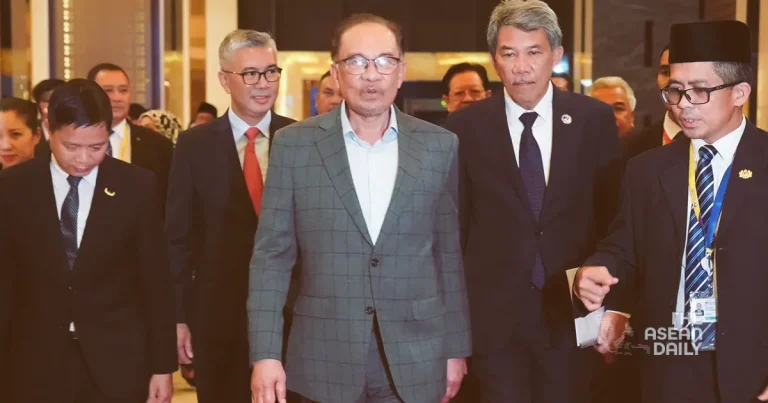10-10-2024 (KUALA LUMPUR) As Malaysia prepares to assume the chairmanship of the Association of Southeast Asian Nations (ASEAN) for 2025, the regional bloc faces a pivotal moment amidst evolving global dynamics. Prime Minister Anwar Ibrahim’s recent foreign policy recalibrations, particularly in fostering closer ties with China and Russia, are poised to influence ASEAN’s trajectory in the coming year.
The symbolic handover of the ASEAN gavel from Laotian Prime Minister Sonexay Siphandone to Anwar Ibrahim at the conclusion of the ASEAN Summit in Vientiane this Friday marks the beginning of Malaysia’s stewardship of the ten-nation bloc. While the rotating chairmanship grants influence rather than unilateral decision-making power, Malaysia’s leadership is expected to bring a fresh perspective to regional diplomacy.
Anwar’s recent overtures towards the BRICS nations (Brazil, Russia, India, China, and South Africa) and his outspoken stance on the Palestinian cause signal a potential shift in ASEAN’s diplomatic engagements. This realignment has raised eyebrows among some ASEAN partners and Western allies, prompting speculation about the bloc’s future direction.
Dr Azmi Hassan, a senior fellow at the Nusantara Academy for Strategic Research, believes Malaysia will advocate for a more central and neutral ASEAN. “Under Anwar’s leadership, we can expect ASEAN to broaden its diplomatic horizons, engaging more actively with BRICS nations while maintaining existing partnerships with Western powers,” he explained.
This diplomatic balancing act was evident in Anwar’s recent invitation to Russian President Vladimir Putin to attend next year’s ASEAN Summit. While this move may ruffle feathers among some ASEAN members and Western allies, it underscores Malaysia’s commitment to diversifying the bloc’s international relationships.
However, Malaysia’s chairmanship faces significant challenges, particularly in navigating ASEAN’s complex relationship with China. As both the current country coordinator for ASEAN-China relations and a claimant state in the South China Sea disputes, Malaysia must delicately balance its warming ties with Beijing against the need to defend ASEAN members’ sovereign rights.
Joshua Kurlantzick, a senior fellow for Southeast Asia at the Council on Foreign Relations, predicts that Malaysia’s multilateral approach will be tested, possibly over resource development in the South China Sea. “Anwar will need to demonstrate deft diplomacy to maintain ASEAN unity while pursuing closer ties with China,” he noted.
Another critical issue on Malaysia’s agenda is the ongoing crisis in Myanmar. Anwar has previously hinted at a tougher stance on the Myanmar junta, potentially advocating for stronger implementation of ASEAN’s five-point consensus plan. This approach could mark a departure from the more cautious stance of previous chairs.
Dr Abdul Rahman Yaacob from the Lowy Institute suggests that Malaysia might push for a transformation in ASEAN’s approach to the Myanmar crisis. “We could see a move away from the troika and consensus decision-making towards a more focused, minilateral platform involving key stakeholders like Thailand,” he proposed.
On the economic front, Malaysia is expected to prioritise the full implementation of the Regional Comprehensive Economic Partnership (RCEP) and drive negotiations on the ASEAN Digital Economy Framework Agreement. These initiatives could position ASEAN as a hub for regional growth and digital cooperation.
As Malaysia takes the helm of ASEAN, the international community will be watching closely to see how Anwar Ibrahim navigates these complex diplomatic waters. His leadership will be crucial in preserving ASEAN’s relevance and unity in an increasingly polarised global landscape.




